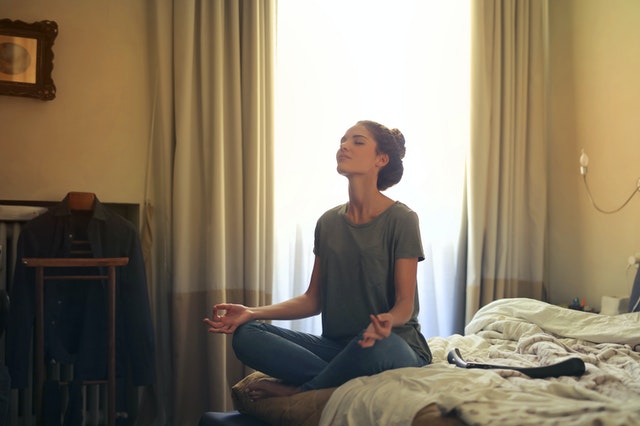Though most people dream of being the types of individuals who wake up each morning with hours to spare in which they can exercise, meditate, journal, read and simply do whatever makes their souls happy, the truth is that most humans are the get-up, get-dressed and run-out-the-door types. While there is nothing wrong with sleeping in now and then, living your life in a harried state is not fun, nor is it healthy. You need a little “you” time, and it’s hard to find that once the rest of the world wakes up. The good news is that you can get that you-time by carving out just 15 minutes of your morning to dedicate to three simple yet, refreshing routines.
Meditate

Per several studies, mediation has several benefits for the mind and body. Among others, included are stress reduction, improved memory and a strengthened immune system.
While these benefits may sound good, you likely think you don’t have time to sit and “ohm” for an hour or more each morning. Well, you don’t have to.
Sitting for just five minutes each morning to detach yourself from all thoughts can profoundly positively affect your entire day. For help with getting into the habit of meditating properly, check out UCLA’s resource of free guided five-minute meditations.
Make Note of 3 Things You’re Grateful For

Similar to the “three good things” strategy used by Martin Seligman, this strategy — as brought to you by a user on Quora — involves writing down three things for which you are grateful each morning. The user encourages you to think about what you have in your life that is good, beyond material objects. These can include friends, family members, helpful neighbors, the laugh of a child, a shift in mindset or a positive development that occurred the day before.
If you have time after coming up with three items, provide an explanation for why you are grateful for them. Starting the day off by showing gratitude — rather, than, say, bemoaning your early work schedule — can help you approach the day with a more positive mindset.
Make Your Bed

Making the bed is a simple habit that has several powerful and surprising benefits for people who actually do it … Which, most people don’t. According to the data, as many as 59% of people don’t make their beds at all, while 12% pay people to do it for them. Only 27% of individuals make the bed on their own. Those individuals are happier and more productive. This is not just a broad generalization, either. Per the data, 72% of bedmakers claim to be happy, while an astonishing 62% of non-bedmakers say they are unhappy.
There are a few reasons this may be so. For starters, making the bed is a keystone habit, which means it can start a chain reaction that could help other positive habits take hold. It’s also a manageable task that, once completed, contributes to a sense of accomplishment. In addition, Bedmaking helps to improve the visual appeal and reduce the clutter effect of your bedroom, which can help to alleviate stress. It also prepares you for things you don’t want to do.
Finally, and interestingly, making the bed may contribute to a better night’s sleep. According to the Sleep Foundation, individuals who make their beds every day are more likely to enjoy a good night’s sleep every day or almost every day compared to individuals who leave their beds a mess.
Starting your day off on a positive note does not have to involve hours of free time in the morning. By setting aside just 15 minutes to meditate, express gratitude and make the bed, you can improve your morning routine and your life.










